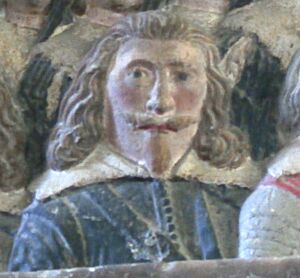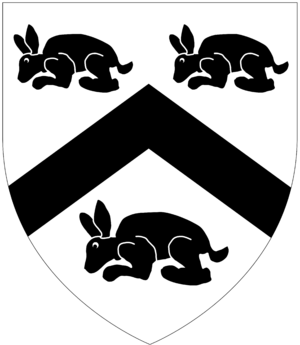William Strode facts for kids
William Strode (born 1598, died 1645) was an English politician. He was a member of the House of Commons, which is like the main part of the UK Parliament today. He served as an MP between 1624 and 1645.
William Strode was famous for being one of the "Five Members". King Charles I tried to arrest these five members in Parliament in 1642, which was against the rules. This event helped start the English Civil War. During the war, William Strode fought on the side of Parliament, against the King.
Contents
Early Life and Education
William Strode was the second son of Sir William Strode. His family lived in Newnham, a place in Devon, England.
He studied law at a famous place called the Inner Temple in London. He also went to Exeter College, Oxford, which is part of Oxford University, and earned a degree there.
Political Career
In 1624, William Strode became a Member of Parliament (MP) for a place called Bere Alston. He was re-elected several times in the years that followed.
Standing Up to the King
William Strode was against King Charles I from the very beginning of his time in Parliament. In 1629, he played a big part in a dramatic event. The Speaker (the person in charge of Parliament meetings) refused to let MPs vote on an important issue. This issue was about the King's power to collect taxes without Parliament's approval. To stop the Speaker from leaving, some MPs, including Strode, held him in his chair!
Because of this, William Strode faced legal trouble. He refused to answer questions about what happened inside Parliament, saying that only Parliament itself could judge its members.
Imprisonment and Release
King Charles I was very angry. To stop Strode from being released, the King sent him and two other MPs to the Tower of London. Strode refused to promise to behave well, so he was kept in prison for eleven years. During this time, King Charles ruled England without calling Parliament together.
In 1640, the King changed his mind and released Strode. William Strode then returned to Parliament, first in the Short Parliament and then in the Long Parliament.
Leading the Parliamentarian Cause
William Strode was a strong supporter of Parliament's power. He suggested that Parliament should have more control over who the King appointed as ministers. He also believed Parliament should control the army and decide how long it would meet.
He strongly supported the "Grand Remonstrance" in 1641. This was a long list of complaints against the King. Strode was also very active in trying to remove powerful people who supported the King, like Earl of Strafford.
The Five Members Incident
On January 3, 1642, King Charles I accused William Strode and four other MPs of treason (being disloyal to the King). The King then tried to arrest them himself inside the House of Commons! This was a shocking event because it was against the rules for the King to enter Parliament and arrest members. This action made the conflict between the King and Parliament much worse and helped lead to the English Civil War.
The English Civil War
William Strode did not want to compromise with King Charles. He pushed for Parliament to get ready for war. He was even present at the Battle of Edgehill in 1642, one of the first big battles of the Civil War.
He continued to work against those who supported the King, including William Laud, the Archbishop of Canterbury. Strode was involved in the process that led to Laud's execution.
William Strode died on September 9, 1645. Parliament honored him with a public funeral in Westminster Abbey. However, after the King's side won power back later, Strode's body was moved from the Abbey and buried in a churchyard.
Who Was William Strode?
Historians have sometimes wondered if the William Strode who was imprisoned in 1628 was the same one who was accused by the King in 1642. But it is now clear that they were indeed the same person.
It's important not to confuse him with other people named William Strode who were also involved in politics at that time. For example, there was a Colonel William Strode who was also an MP and supported Parliament. There was also a William Strode who was a poet and writer.
 | Georgia Louise Harris Brown |
 | Julian Abele |
 | Norma Merrick Sklarek |
 | William Sidney Pittman |



